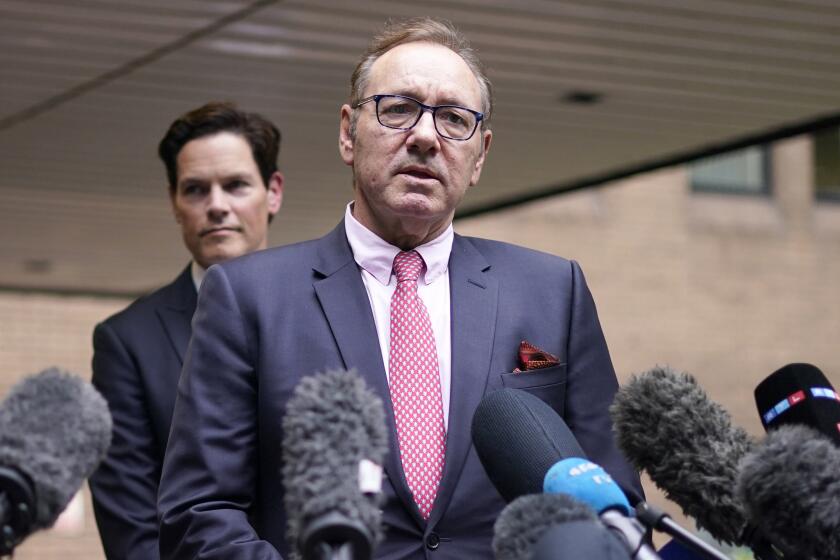Watching a huge bet on box-office futures go sour
Richard Jaycobs spent years preparing to bring Wall Street-style speculation to the high-risk world of Hollywood moviemaking. Lawmakers in Washington don’t think it’s such a good idea.
Jaycobs is president of Cantor Exchange, a business set up by Wall Street trading firm Cantor Fitzgerald to create a market for trading futures contracts based on box-office results. Movie investors and traders would have been able to hedge a film by betting it would underperform or increase an investment by gambling on strong ticket sales.
Cantor has been considering launching such an exchange since 2001, when it acquired Hollywood Stock Exchange, an online game for predicting box-office receipts.
Cantor and a competing exchange, Media Derivatives, appeared to be headed toward a smooth launch until March, when the Motion Picture Assn. of America, representing Hollywood’s six movie studios, announced its vehement opposition to box-office futures trading.
The studios failed to persuade the Commodity Futures Trading Commission to reject box-office futures but are on the verge of getting their way by lobbying lawmakers (who control the agency’s budget). MPAA lobbyists persuaded Sen. Blanche Lincoln (D-Ark.) to insert a provision banning box-office futures trading into a bill establishing tougher regulations on financial markets in the wake of the 2008 economic meltdown.
The provision remained in the final version of the bill that came out of a House-Senate conference and was passed Wednesday by the House of Representatives. It appears likely to be passed by the Senate as well, and President Obama has said he would sign the legislation.
Company Town spoke to Jaycobs on Monday, the same day the Commodity Futures Trading Commission gave Cantor Exchange final approval for box-office futures.
--
Assuming this bill becomes law, do you see any possibility of still doing box-office futures?
The broader opportunity of motion picture finance is still something we have to evaluate, but we know now we’re not going to do futures contracts. The bill is quite clear that the idea of a futures market is prohibited.
--
Were you surprised that the MPAA came out against this market in March, relatively late in the process?
The initial opposition was not a surprise. Every industry facing a new futures market has opposed it. We did a follow-up meeting with the MPAA where they made it quite clear they were not prepared to discuss the merits of their objection. They have always remained opposed and unmoved.
--
The only industry figure not consulting for you or Media Derivatives who spoke out in support of box-office futures was Lions Gate Entertainment Vice Chairman Michael Burns [a co-founder of Hollywood Stock Exchange]. Why weren’t you able to get more people from Hollywood on your side?
Up until the time in April that it was in the legislation, more people were prepared to come out and speak positively so long as it was only a regulatory issue.
I give the MPAA credit: By getting [a ban] in the bill, most people said it’s going to stay there and didn’t want to expose their business or personal income by coming out and trying to change something that seemed like a fait accompli.
The MPAA controls the channels of distribution and the money flow in Hollywood.
--
The head of Media Derivatives said his company spent more than $10 million developing its box-office futures market. How much has Cantor invested in this effort?
Our interest in motion picture finance goes back to the late ‘90s, including the Hollywood Stock Exchange. So we have spent multiples of what Media Derivatives did. But we will bring out other products. This area is not lost just because of the work we put into the exchange.
--
If box-office futures are dead, are there other things you can start doing in movie finance?
Probably yes, but not in the near term.... We need to go back to the drawing board.
Our vision was that if you can put a transparent marketplace around films and broaden the audience to a public market, you would have tremendous amounts of capital flowing into the business.
Without this [futures] vehicle, I don’t know that we still see the opportunity the same way.
--
During this process, did you ever look at movies and say to yourself, “I could have made a lot of money on that if only our market was up and running?”
My whole career has been running exchanges, not trading, so I try to stay away from that. But someone recently reached out to me and said, “Look at [box-office flop] ‘Jonah Hex,’ ” and I did. So the answer is, yes, any time a film underperforms, you look at it from that perspective.
By the same token, investors said that they would have liked to have participated in [box-office success] “Alice in Wonderland.” That’s what makes a market beautiful: People say, “I’ll take the risk.”
More to Read
The biggest entertainment stories
Get our big stories about Hollywood, film, television, music, arts, culture and more right in your inbox as soon as they publish.
You may occasionally receive promotional content from the Los Angeles Times.






